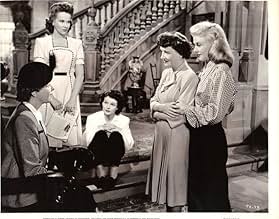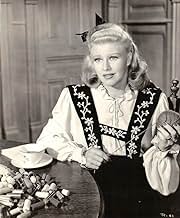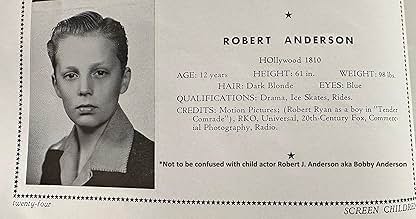Jo Jones, a young defense plant worker whose husband is in the military during World War II, shares a house with three other women in the same situation.Jo Jones, a young defense plant worker whose husband is in the military during World War II, shares a house with three other women in the same situation.Jo Jones, a young defense plant worker whose husband is in the military during World War II, shares a house with three other women in the same situation.
- Awards
- 4 wins total
- Chris Jones as a boy
- (uncredited)
- Western Union Girl
- (uncredited)
- Minor Role
- (uncredited)
- Boy
- (uncredited)
- Minor Role
- (uncredited)
- Doctor
- (uncredited)
- Mrs. Flanagan - Jo's Mother
- (uncredited)
- Waldo Pierson
- (uncredited)
- Baby
- (uncredited)
- Boy
- (uncredited)
- Director
- Writer
- All cast & crew
- Production, box office & more at IMDbPro
Featured reviews
The main character of the film is Ginger Rogers and is about her dealing with life without her husband, Robert Ryan, who is at war. While he does appear in the first 15 minutes or so of the film, he is primarily seen through a series of flashbacks interspersed through the movie. These all give background as to the life this couple shared before the war. As for Ryan, he came off very well in these vignettes, though Rogers' character seemed a bit too petulant to be believable and I was half expecting Ryan to slap her upside the head to shut her up (folks, I am NOT encouraging spousal abuse--relax)! Later in the film she had mellowed quite a bit and was indeed a very sympathetic and good character.
Ginger and her co-workers begin talking after Ryan goes back to the war and they mutually decide to rent a house together and share expenses. At this point, the story involved the the lives of these four other women--their motivations, back story and character. This is all told in a very effective manner and you really begin to care for the ladies.
The purpose of this tearjerker was to solidify the resolve for the war with the people left behind in the States and in this light, this was a super-effective film. Generally excellent writing, direction and acting make this a film that is easy to connect to and like. It also makes the movie a tough one to watch, as you tend to go through an emotional roller-coaster because of all the ladies' trials and tribulations. A wonderful time capsule of the era and a film well worth seeing.
Oddly, in later years, many of those responsible for this film were labeled "Communists" and the film was cited as an example of these left-leaning sympathies. Other than the fact the ladies live together and share their money, I really can't see how any sane person could construe this as Communism--and what's the matter with sharing a home and expenses anyway? I did that a while back and I don't THINK I'm a Communist!!
Four war wives who work in a munitions plant decide that if they pool their salaries and resources that instead of four individual run down rooms for rent that they can rent one spacious house with a bedroom for each, a kitchen, a living room, and a housekeeper. They sell one of the two cars they have between them and use the money to fix up the one remaining car and share it. Apparently this is Communism. Let's just ignore the fact that, at the time, movies were being made that were loaded with pro Russian propaganda because the Americans needed the Russians in the war effort. That was then this is now, as they say.
Other than that, it treads pretty traditional wartime material. One wife (Ruth Hussey) was a bit of a good time girl before the war and rather resents the fact that her good-time husband joined the navy before Pearl Harbor even happened. Another (Kim Hunter) got married on the spur of the moment and had to see her husband off that afternoon. Another (Patricia Collinge) has both a son and a husband in the war.
The central figure, though, is war wife Jo Jones (Ginger Rogers), and most of the film is about her relationship with her soldier/husband Chris (Robert Ryan) before the war as she flashes back to various scenes from their marriage. This part of the film uses a strange device. Whenever there is a scene in which Jo reminisces about Chris, the scene switches to a shot of the two of them in the distance, holding hands with clouds surrounding them, like they are in heaven, before launching into the flashback.
This gets pretty sentimental at times, and Ginger verges on hamming it up, but it did hold my interest for the rather long running time and is a splendid time capsule of the war years.
The scenes between Rogers and Ryan are well-written and finely acted. Trumbo and the actors capture (most unusually for almost any movie) how a generally happy marriage works and how a quarrel might develop. Watch the scenes where these two are together. They are (mostly) free of the propaganda that does not age well.
The rest of the movie. Well, the characters are types and serve as mouthpieces for the "We must sacrifice for the war effort" line being sold by the movie. If one is looking for preposterous moments of the cinema, one can flip forward to the scene where our group home's housekeeper gets in a rage because the butcher slipped an extra piece of bacon in the order. (Followed by a confession of hoarding by one of the girls in the house. Followed by an anti-foreigner tirade by the most ethically challenged of the group residents.) There is some decent 'ol fashioned movie rhetoric in this part, but, mostly, this section is hokum.
Rogers was a member in good standing of Hollywood's right wing and Tender Comrade came under the scrutiny of the House Un-American Activities Committee. With writer Dalton Trumbo and director Edward Dmytryk two of the Hollywood Ten involved it had a star place in the proceedings.
With the word 'comrade' in the title that's if you'll pardon the pun a red flag in front of these bulls. I mean isn't that what Communists call each other? And the plot concerning four Rosie the Riveteer types teaming up to buy a house and share expenses for the duration, clearly Communist and subverting the American ideal of rugged individualism. And dialog talking about a more unselfish world. This bares investigation.
Ginger, along with other marrieds Ruth Hussey, Patricia Collinge, and Kim Hunter all decide to live together and it seems like a practical decision. They make another one when since they're all doing factory work and come home bone tired they pool part of their salaries and hire a live-in housekeeper Mady Christians. This woman is a refugee from Germany and she provides some valuable insights into the foe their husbands are fighting.
Tender Comrade like so many films of the WW2 era talked a lot about building a better world and God knows what is wrong with that? It turned out to be a dream, but God help us if we ever have a world where no one dreams of making it better.
We also have some flashback scenes that are done well with Ginger and her husband Robert Ryan in the service. They show a typical Mr.&Mrs. Young America at the time and they had a universal identification.
Kim Hunter's husband comes home on leave and he's played by Richard Martin, one of the few times you will see him on film not playing Chit Jose Gonzalez Bustamante Rafferty. Treasure this film for that alone. And also for Ginger Rogers fine and eloquent soliliquy at the end.
It wasn't only Dmytryk and Trumbo who got blacklisted. So did Kim Hunter, Patricia Collinge, and Mady Christians. Lot of political casualties came out of this very fine film about the WW2 homefront.
Did you know
- TriviaThis film was introduced as evidence when director Edward Dmytryk and writer Dalton Trumbo were hauled before the House Un-American Activities Committee, which was investigating them on suspicion of being Communists. Despite the film's many flag-waving speeches, the communal living arrangements of the ladies in the film was cited as evidence of how Dmytryk and Trumbo attempted to brainwash unsuspecting American moviegoers with Communist propaganda. As even more damning evidence, there was the use of the word "Comrade" in the title.
- GoofsWhen Chris comes around the hanging laundry in Jo's flashback, we hear the end of his whistling "You Made Me Love You," but his face is totally relaxed, and clearly not that of a person who is whistling.
- Quotes
Jo Jones: We're going to pool all of our salaries and we'll pay the rent, take care of the expenses of the house, and what's left over, we'll split five ways. You see, we're running this joint like a democracy!
Manya Lodge: Like a democracy! Oh, that's good! That's good. Once, in Germany, we had a democracy. But we...
Helen Stacey: You lost it.
Manya Lodge: Nein. We did not lose it. We let it be murdered - like a little child.
- Crazy creditsTO MY WIFE - Teacher, Tender Comrade Wife, A fellow-farer true through life, Heart-whole and soul-free, The August Father, Gave to me. Robert Louis Stevenson
- ConnectionsFeatured in Hollywood the Golden Years: The RKO Story: Dark Victory (1987)
- SoundtracksSymphony No. 40 in G minor K. 550
(1788) (uncredited)
Written by Wolfgang Amadeus Mozart
First movement played on the radio in the opening scene
- How long is Tender Comrade?Powered by Alexa
Details
- Runtime1 hour 42 minutes
- Color
- Aspect ratio
- 1.37 : 1
Contribute to this page


































